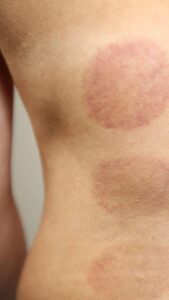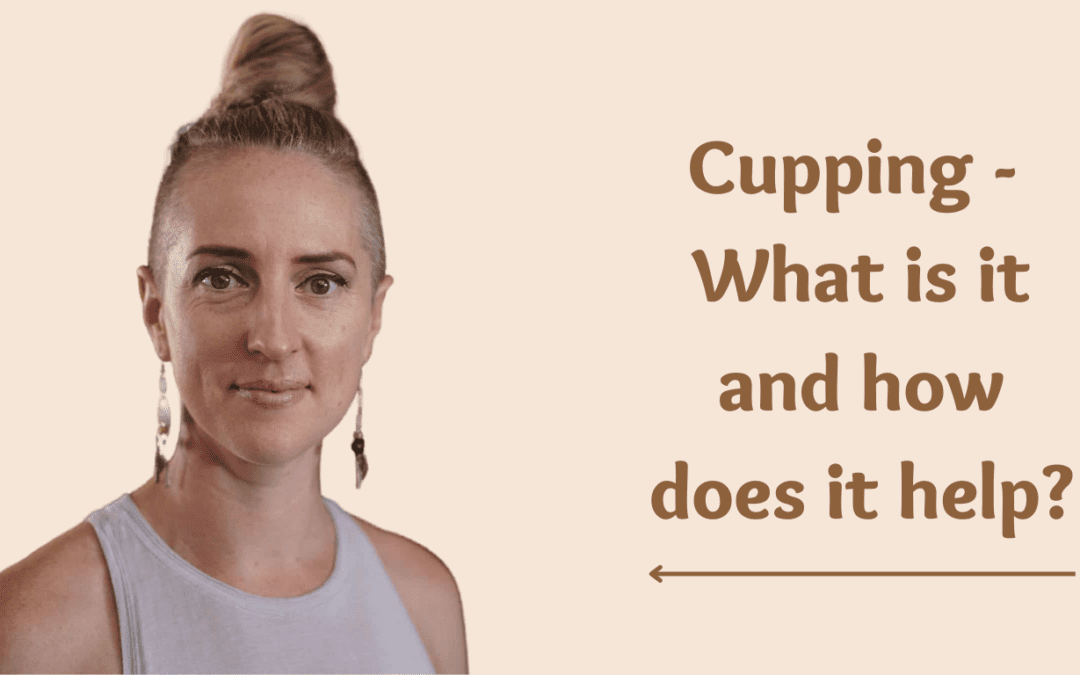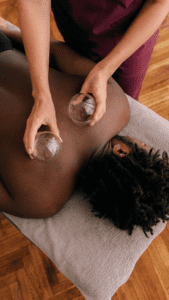Cupping – What is it and how does it help?
You have probably seen somebody who has had cupping on their body, and everyone always asks, what is it and how does it help?
Those strange round red or purple marks that look like they had a curious interaction with a giant octopus! These are the marks left on the body after a cupping session.
Cupping is a practice that has been used by many cultures, not just in Chinese medicine. It is still widely used today throughout Asia and the Middle East as a method to help the body clear toxins and to heal certain ails.
In a Chinese Medicine treatment, cupping is a technique of using small, medium or large-sized glass cups that are suctioned to the body using fire to remove oxygen from the glass and then placed quickly onto the body, usually the back, and sometimes the lower body or even the abdomen.
 The suction action helps to pull blood and fluids up through many layers of muscle, fascia and soft tissue towards the skin. As the blood is pulled to the surface, the many layers of tissue beneath are essentially cleaned and cleared by this action, bringing circulation to the area, and helping the body to clear out toxic debris that has been trapped in the tissue.
The suction action helps to pull blood and fluids up through many layers of muscle, fascia and soft tissue towards the skin. As the blood is pulled to the surface, the many layers of tissue beneath are essentially cleaned and cleared by this action, bringing circulation to the area, and helping the body to clear out toxic debris that has been trapped in the tissue.
This is why the cupping marks can vary from pale, red, purple, and even deep plum or black in some cases.
The deeper the colour, the more qi and blood stasis has been stuck in the tissues needing release.
Sometimes a deeper colour can also mean that the cups were applied to the body very tightly, as opposed to lightly which may result in a paler cupping mark.
Cupping can be a great remedy for stiff and tight muscles that have been sedentary for long periods of time (hello lockdown life!). It can help to loosen up the back and help the body to get blood and fluids into tissues that have been dry and stiff.
We also use it as a method to help to clear things out of the body such as excess heat, damp, cold, and wind which are all considered to be pathogenic factors in Chinese medicine that can create all sorts of mischief inside the body.
So, if somebody had a high fever, or if somebody had a lot of excess fluid retention, not always, but sometimes, depending on the choices of the practitioner, cupping could be selected as a tool to help clear these excesses out and up to the surface of the body.
From a western medicine perspective, the action of cupping creates a local site of inflammation in the body. Whenever that cascade of inflammatory response occurs, the body will send a flood of fighter cells both systemically throughout the body, and also to the local area itself.
This means that a session of cupping could actually be a great way to help the body kickstart its own healing process when recovering from something like a cold or a flu.
Cupping can be stationary or dynamic. So the cups can just be suctioned onto the body and left in place, or we can do something that is called sliding cupping. Just as the name suggests, sliding cupping is where we suction the cups onto the back and then slowly drag them up and down the back (that is well oiled), or from side to side.
Patients can have very different responses to this, especially as the cups are moved over regions of the back that are chronically tight and sore. I call sliding cupping “vacuuming the back” as it always reminds me of a robotic pool or floor vacuum cleaner. More often than not, people really enjoy the sensation of the sliding cups, and just like the stationary cups there will be marks left on the body in big strips rather than round circles.
When receiving cupping it is always important that you are asked if the sensation is ok, as the feeling of suction can be strange and can increase over time. Every one of us has a different level of tolerance to pain and sensation, so knowing that the practitioner can reduce some of the pressure is important to check in about before they leave the room and you have stopped breathing in response to the sensation!
The cups are generally left on for about 5-10 minutes approximately, but if a person is very exhausted and qi deficient 5 minutes is enough time, whereas a very healthy robust person might be ok for the cups to be left on for a little bit longer than ten minutes.
It is also really important that your practitioner checks with you before starting the cupping if you are ok that there will be visible marks left on your skin! I often make a joke with my patients and say “now no wearing any backless dresses to work this week ok!” But in all seriousness, if someone is in a bridal party, or had a photo shoot, those marks are pretty distracting and will definitely be a talking point.
The marks left on the body after cupping can look pretty brutal, but they do not hurt, or at least they should not hurt. If they are tender, it could mean that the cups were too strong, or they were left on the body for too long.
Healthy circulation should clear up the marks within a week and then they will be very faint or gone completely.
I have lots of patients that absolutely love receiving cupping, but it is one of those experiences that won’t make sense until you have tried it out for yourself.
So, if you have significant cupping curiosity, come and try it out.
Love, Karina x



